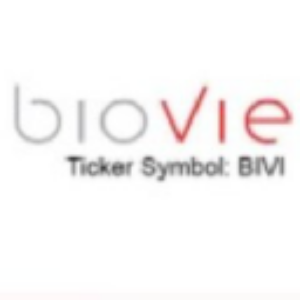BioVie Announces Data Highlighting Bezisterim’s Potential to Slow or Reverse Biological Aging and Neurodegeneration Featured as a Keynote Talk at the 7th World Aging and Rejuvenation Conference
Rhea-AI Summary
BioVie (NASDAQ: BIVI) presented promising data on bezisterim at the 7th World Aging and Rejuvenation Conference, highlighting its potential to slow biological aging and neurodegeneration. The Phase 3 NM101 study analysis revealed that bezisterim-treated Alzheimer's patients showed significant biological age reduction compared to placebo across multiple epigenetic clocks, with differences ranging from -1.38 to -4.24 years.
The study demonstrated bezisterim's ability to modulate inflammation and gene activation, with treated patients showing significant improvements in key biomarkers including -8.5 mg/dL in fasting glucose, -15 mg/dL in cholesterol, and -90.5 pg/mL in MCP. Bezisterim, a stabilized version of Beta AET, uniquely offers oral availability and blood-brain barrier penetration while maintaining favorable safety profiles in Alzheimer's and Parkinson's Disease trials.
Positive
- Multiple epigenetic clocks showed significant biological age reduction in treated patients
- Significant improvements in metabolic and inflammatory biomarkers
- Drug demonstrates ability to cross blood-brain barrier with favorable safety profile
- Unique oral formulation overcomes limitations of natural Beta AET
Negative
- Phase 3 analysis based on relatively small sample size (n=33)
- Some epigenetic clock measurements did not reach statistical significance (GrimAge p=0.148)
News Market Reaction
On the day this news was published, BIVI declined 4.96%, reflecting a moderate negative market reaction.
Data tracked by StockTitan Argus on the day of publication.
CARSON CITY, Nev., July 09, 2025 (GLOBE NEWSWIRE) -- BioVie Inc. (NASDAQ: BIVI) (“BioVie” or the “Company”), a clinical-stage company developing innovative drug therapies for the treatment of neurological and neurodegenerative disorders and advanced liver disease, presented “Bezisterim Epigenetic Effects on Aging and Neurodegeneration” at the 7th World Aging and Rejuvenation Conference (ARC-2025) taking place in Vienna, Austria, July 9th –10th, 2025.
Unlike historical approach to Alzheimer’s Disease (AD) treatment that focuses on changing one gene product (e.g., amyloid, p-Tau) at a time, bezisterim modulates inflammation and is believed to help reestablish homeostasis and small changes in many genes at the same time. The data suggest that bezisterim may alter biological age by anti-inflammatory epigenetic modifications. Epigenetic biomarkers can measure “Epigenetic Age Acceleration” (EAA), which is defined as the difference between observed biological age as measured by DNA methylation and the chronological age (i.e., years since birth).
An analysis of the Company’s Phase 3 NM101 study (NCT04669028) evaluating bezisterim in patients with mild-to-moderate probable AD assessed 33 blood samples of patients treated with bezisterim (n = 17) and placebo (n = 16) using five validated epigenetic “biological” clocks that analyze genes linked to aging, as well as age-related inflammatory markers. In this analysis, treatment with bezisterim demonstrated:
- Biological Aging Effects. After 30 weeks of treatment, the average difference between the placebo and bezisterim groups was −3.16 years for SBCAge (p = 0.036), −4.12 years for PhenoAge (p = 0.048), −1.38 years for GrimAge (p = 0.148), −4.24 years for Hannum clock (p = 0.015), and −3.77 years for InflammAge (p = 0.050). The various “biological clocks” measure the extent of age deceleration1 advantage bezisterim-treated patients have compared to those treated with placebo.
- Gene modulation effects. Bezisterim-treated patients experienced decreased activation of various genes associated with inflammatory kinase cascades, aging and cognition, leading to potentially beneficial changes in aging and AD pathophysiology.
- Metabolic and inflammatory biomarker effects. Bezisterim-treated experienced significant improvements from baseline on metabolic and inflammatory biomarkers compared to those treated with placebo, including -8.5 mg/dL on fasting glucose (p=0.036), -15 mg/dL in cholesterol (p=0.049), and -90.5 pg/mL in MCP (p=0.007). Bezisterim-treated patients also experienced a decrease in carbohydrate metabolism, glycolysis, and Type 2 diabetes pathophysiology.
“Biological aging is the single greatest risk factor for the development of dementia, and we believe our work with bezisterim represents a promising strategy to target the underlying mechanisms of neurodegeneration,” said Christopher Reading, PhD, Senior Vice President of BioVie’s Alzheimer’s Program. “We are honored to share these data that may illuminate bezisterim’s potential to target epigenetic-driven age acceleration as a treatment for Alzheimer’s and other neurodegenerative diseases of aging. We are conducting ongoing studies to further explore these intriguing findings and how bezisterim may help everyone improve healthspan in normal aging.”
Bezisterim is a unique, stabilized version of Beta AET, a naturally occurring brain metabolite of dehydroepiandrosterone (DHEA), which has demonstrated anti-inflammatory and immunomodulating activity in humans, but that naturally decreases with age. Beta AET itself cannot be taken in oral form, a major limitation that Bezisterim may address. Unlike its naturally occurring counterpart, Bezisterim is metabolically stable, orally available, and able to cross the blood-brain barrier. It has demonstrated anti-inflammatory effects through inhibition of NF-kappa B, a central mediator of inflammation, and has shown insulin-sensitizing properties. Notably, Bezisterim is not immunosuppressive, and has demonstrated favorable safety and tolerability profiles across in-vivo clinical trials in AD and Parkinson’s Disease (PD).
About Bezisterim
Bezisterim (NE3107) is an orally bioavailable, blood-brain barrier (BBB)-permeable modulator of inflammation and insulin-sensitizer. In addition, it is not immunosuppressive and has a low risk of drug-drug interaction. By binding to ERK and selectively modulating NFκB activation and TNF-α production, BioVie believes that bezisterim may offer clinical improvements in several disease indications, including Alzheimer’s disease, Parkinson’s disease and long COVID.
In Parkinson’s disease, BioVie is currently enrolling patients in the Phase 2 SUNRISE-PD clinical trial evaluating the safety and efficacy of bezisterim on motor and non-motor symptoms in patients who have not been treated with carbidopa/levodopa, with topline data expected in late 2025 or early 2026. A previous Phase 2 study of bezisterim in Parkinson’s disease (NCT05083260) completed in 2022, and data presented at the AD/PD™ 2023 International Conference on Alzheimer’s and Parkinson’s Diseases and related neurological disorders in Gothenburg, Sweden in March 2023, showed significant improvements in “morning on” symptoms and clinically meaningful improvement in motor control in patients treated with a combination of bezisterim and levodopa versus patients treated with levodopa alone, and no drug-related adverse events.
In long COVID, bezisterim has the potential to reduce neurological symptoms, including fatigue and cognitive dysfunction. Persistently circulating viral spike proteins are believed to trigger TLR-4 driven activation of NFκB and the subsequent expression of inflammatory cytokines (IL-6, TNF, IFNg). BioVie’s Phase 2 ADDRESS-LC study, is a randomized (1:1), placebo-controlled, multicenter trial in approximately 200 patients to evaluate the safety, tolerability and potential efficacy of 3 months of treatment with bezisterim to reduce the neurocognitive symptoms associated with long COVID, including difficulty concentrating or remembering things (“brain fog”) and fatigue.
In Alzheimer’s disease, BioVie conducted and reported efficacy data on its Phase 3 randomized, double-blind, placebo-controlled, parallel-group, multicenter study to evaluate bezisterim in patients who have mild-to-moderate Alzheimer’s disease (NCT04669028) in 2023. Results of a Phase 2 investigator-initiated trial (NCT05227820) showing bezisterim-treated patients experienced improved cognition and biomarker levels were presented at the Clinical Trials on Alzheimer’s Disease (CTAD) annual conference in December 2022. An estimated six million Americans suffer from Alzheimer’s disease.
About BioVie Inc.
BioVie Inc. (NASDAQ: BIVI) is a clinical-stage company developing innovative drug therapies for the treatment of neurological and neurodegenerative disorders (AD, Parkinson’s disease and long COVID) and advanced liver disease. In neurodegenerative disease, the Company’s drug candidate bezisterim inhibits inflammatory activation of extracellular signal-regulated kinase and the transcription factor nuclear factor-κB, and the associated neuroinflammation and insulin resistance but not ERK and NFκB homeostatic functions (e.g., insulin signaling and neuron growth and survival). Both neuroinflammation and insulin resistance are drivers of AD and PD. Persistent systematic inflammation and neuroinflammation are key features in patients with neurological symptoms of long COVID. In liver disease, the Company’s Orphan drug candidate BIV201 (continuous infusion terlipressin), with FDA Fast Track status, is being evaluated and discussed with guidance received from the FDA regarding the design of Phase 3 clinical testing of BIV201 for the reduction of further decompensation in participants with liver cirrhosis and ascites. The active agent is approved in the U.S. and in about 40 countries for related complications of advanced liver cirrhosis. For more information, visit www.bioviepharma.com.
Forward-Looking Statements
This press release contains forward-looking statements, which may be identified by words such as "expect," "look forward to," "anticipate" "intend," "plan," "believe," "seek," "estimate," "will," "project" or words of similar meaning. Although BioVie Inc. believes such forward-looking statements are based on reasonable assumptions, it can give no assurance that its expectations will be attained. Actual results may vary materially from those expressed or implied by the statements herein due to the Company's ability to successfully raise sufficient capital on reasonable terms or at all, available cash on hand and contractual and statutory limitations that could impair our ability to pay future dividends, our ability to complete our pre-clinical or clinical studies and to obtain approval for our product candidates, our ability to successfully defend potential future litigation, changes in local or national economic conditions as well as various additional risks, many of which are now unknown and generally out of the Company's control, and which are detailed from time to time in reports filed by the Company with the SEC, including quarterly reports on Form 10-Q, reports on Form 8-K and annual reports on Form 10-K. BioVie Inc. does not undertake any duty to update any statements contained herein (including any forward-looking statements), except as required by law.
For Investor Relations Inquiries:
Chuck Padala
LifeSci Advisors, LLC
chuck@lifesciadvisors.com
For Media Inquiries:
Melyssa Weible
Elixir Health Public Relations
mweible@elixirhealthpr.com
1 Defined as the difference between observed biological age as measured by DNA methylation and the chronological age (i.e., years since birth).








